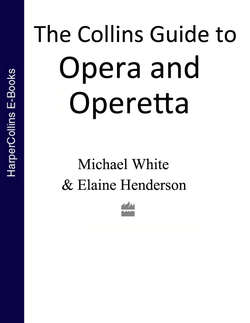Читать книгу The Collins Guide To Opera And Operetta - Michael White - Страница 50
ОглавлениеLouise
FORM: Opera in four acts; in French
COMPOSER: Gustave Charpentier (1860–1956)
LIBRETTO: Gustave Charpentier (and, possibly, Saint-Pol-Roux)
FIRST PERFORMANCE: Paris, 2 February 1900
Principal Characters
Louise, a young Parisian working-class girl Soprano
Her mother Soprano
Her father Baritone
Julien, a young poet Tenor
Synopsis of the Plot
Setting: Montmartre, Paris
ACT I Louise and Julien are in love, but Julien has failed to gain Louise’s parents’ approval for their marriage. He tells Louise that he has written again to her parents but, if they still refuse to let them marry, she must elope with him. Louise’s mother mocks Julien, saying he is a lazy good-for-nothing who drinks too much, and they argue violently until Louise’s father comes home and opens Julien’s letter. He tries to be reasonable but his wife becomes increasingly vituperative about Julien, and Louise collapses in tears.
ACT II Early in the morning Julien and his friends are waiting near Louise’s workplace. When she arrives he manages to talk to her, but is angered by her refusal to leave her parents, without their blessing, to live with him. At work, the other girls tease Louise and then discuss the glories of love and romance. When Julien appears outside the window to serenade her, Louise can bear no more and abruptly leaves the workroom to join him.
ACT III Now happily living together and very much in love, Julien and Louise take part in the local carnival procession, during which Louise is crowned Muse of Montmartre. But when Louise’s mother appears it is as a very different person from the termagant of Act I; looking sad and anxious, she explains that Louise’s father is very ill and desperate to see his daughter. On the understanding that she can leave when she wants to, Louise finally agrees to go and see him, despite Julien’s suspicions.
ACT IV Louise’s father has recovered but he has changed and become irritable and dissatisfied with his life. Both he and Louise’s mother refuse to let her go back to Julien, in spite of her obvious sadness and longing. In the end Louise insists on leaving, pushing past her father as he tries to bar the way, and leaving him to curse Paris, which has stolen his daughter from him.
Music and Background
Bustling with the atmosphere of Montmartre street life, Charpentier’s score is rich in local colour and memorable for the avant-garde incorporation of sewing-machine noise, in the interests of realism. Otherwise, the music is more conventional for its time than is the Zola-esque story of free-living and loving it sets. Influences are basically Gounod and Massenet.
Highlights
This is effectively a one-number opera and the (very celebrated) number is the Act III romance with which Louise celebrates her happiness with Julien, ‘Depuis le jour’.
Did You Know?
Louise was sensationally successful on its first night and was performed one thousand times in Paris alone during Charpentier’s lifetime.
Recommended Recording
lleana Cotrubas, Plácido Domingo, New Philharmonia Orchestra/Georges Prêtre. Sony S3K 46429. Nicely done and no real competition.
